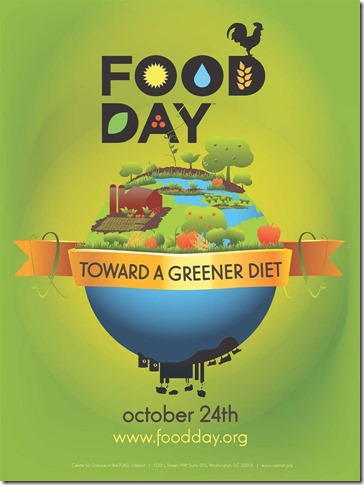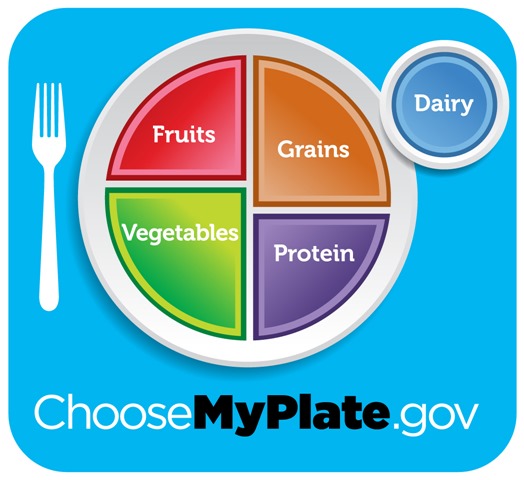Happy Food Day!
Well, a few days late. We celebrated a few days late at school, since Food Day, October 24th, actually fell on a Saturday this year.
What is Food Day, you ask? According to their site, Food Day exists to inspire Americans to “change their diets and their food policies”, bringing people together to celebrate & enjoy real food, and improve food policies, while changing individuals diets and solve food-related problems at local, state and national levels. Each year has a theme, and this years theme was “Toward a Greener Diet”, as a way to address health and environmental issues. As we know, and the site reinforces, consuming meat (generally from major companies) takes a huge toll on the environment. To learn more about your diet’s impact on your health and the environment, answer 14 Questions that Could Save Your Life and the Planet.
At school, we had the Fitness Dietician from a local gym present on: “Towards a Plant Based Diet”. Here are some key takeaways:
– The USDA recommends we all get 1.5-2 servings of fruit & 2-3 servings of veggies per day (for an average adult). However, about 50% of the population gets less than 1.5 servings of veggies/1 serving of fruit! AND the vegetable for majority of people is potatoes.
– Plant based diets generally lead to a healthier life for a few reasons: you are naturally consuming less LDL (bad cholesterol) and animal saturated fats, and consuming more fruits, vegetables, and legumes, leading to diseases such heart disease
– Antioxidants are compounds in plant based foods. They literally stop the oxidizing of free radicals. Free radicals are lone electrons (e-) in our body; they do not like to be alone. They go and attack other compounds in our bodies, trying to steal electrons to form a bond, and this is called oxidative stress. Antioxidants are able to stop or slow down this process, which naturally occurs (by everyday things such as eating or exercising, but is more from things like pollution and smoking). Consuming a wide variety of foods gives you a wide variety of antioxidants.
– Meals! The USDA abolished the Food Pyramid a few years ago, and replaced it with “My Plate”
where 1/2 the plate should be produce/”plant based”, and includes a side of dairy/calcium source. They have a suggested meal plan to incorporate all of your servings:
Breakfast: Dairy, Protein, Fruit, Grain
Snack:: Dairy, Fruit
Lunch: Fruit, Protein, Grain, Veg
Snack: Dairy, Veg
Dinner: Veg, Protein, Grain
– Eating healthy & your wallet! The Harvard School of Public Healthy conducted a research study, concluding that on average, the person who ate a “healthier” diet (and this was for someone who ate ~2000 cal/day) spent only $1.50 a day more, more, BUT, think: this is half the price of a typical Starbucks drink, or the price of a soda instead of water, if you get it while shopping out. ALSO, they found the most expensive part of a “healthier” person’s diet was lean meat. So, some money can easily be saved by swapping a few servings for a plant based proteins, of which the cheapest is beans & legumes.
– Did you hear about the latest news from WHO? Their new released stated that the consumption of red meats are probably carcinogenic to humans and processed meats are carcinogenic to humans, saying they had “sufficient evidence that the consumption can lead to colon cancer”, specifically. Processed meats were classified as “Group 1” carcinogenic to humans, which is actually the same category that substances such as tobacco are classified in. HOWEVER, this does not mean they are equally dangerous, but classifies strength. In all, eating these meats occasionally won’t kill you, but if your diet consists of bacon for breakfast, deli meat for lunch, and hot dogs for dinner, that is a LOT of processed, nitrite containing meat, which should be re-evaluated. One key take away here is Deli meat! Many students and adults pack a turkey sandwich or something similar, which with wheat bread, veggies and fruit, could be a pretty healthy meal. However, we need to be sure these foods still aren’t processed!
– Lastly, we went over how to incorporate more plant based foods into our lives, especially as students!
1. use the salad bar! luckily have a huge salad bar, so as long as it is well stocked (which can be iffy…), you can add veggies into your meal easily, either by having a side or entrée salad, or incorporating it in a way below
2. add veggies into your pasta, be it noodles or creamy mac & cheese, which it is still hot, and they’ll quickly cook down (i.e. greens from the bar into hot mac and cheese, you could even add it into chili or a creamy soup)
3. add some greens into your panini or grilled cheese, and/or serve with side of soup (preferably broth based, but any veg soup is good)
So that’s that! I found it all very interesting, considering I’m interested in nutrition, medicine, and sustainability! I knew a lot of this before, but learned about the Harvard Health Study! I also already incorporate many of the suggestions she had for eating in the dining hall. I loved that her overall takeaway was NOT eating a solely plant based diet, but to incorporate more fruits, vegetables, whole grains, buts/seeds & legumes into our diets, as much as possible. Limit/cut out refined grains and processed foods. We don’t have to do it all at once, but do have to do it mindfully for it to work, and it can be as easy as adding 1 serving of fruit or vegetables to each main meal, and slowly, it might push other not-so-good foods out of the way!
Well, I’m off to do some organic chemistry!
~Masala Girl
what are you thoughts on Food Day 2015? On a plant based diet? On the environment? ![]()

